#anti-bryke
Text
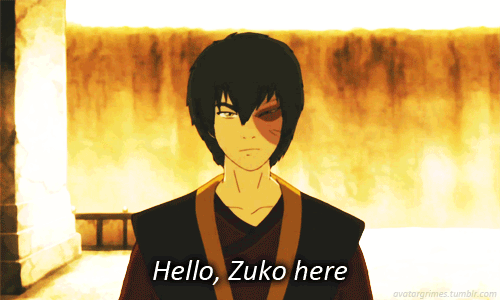
Guess who's started to watch the Atla liveaction remake, only to be swept away by a massive wave of nostalgia for the original, stopped watching the remake half-way-through and decided to do her first proper OG Atla rewatch since before TLoK aired instead?
Yes, me. It's me.
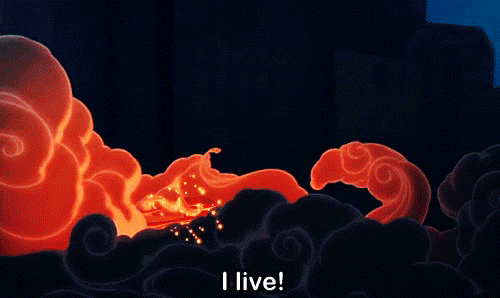
Get ready, cause I'm gonna blog about Atla the way I would have back in 2000-fucking-8 if I had had access to a functioning internet connection.
Blacklast #zutara and #anti-bryke RIGHT NOW if you don't want daily updates on why Zutara should have been canon.
Welcome to the twisted mind of 15-year-old me.

PS I just reached The Storm and I AM NOT OKAY
#zutara#atla#atla-rewatch#anti-bryke#anti-kataang#just so everyone knows where I stand#god I haven't properly been on Tumblr for so long#I missed the GIFs and the memes and everything#coming back to tumblr feels like coming home#do any of my mutuals still exist on here?#is the#jonsa#fam still around?#not really relevant really but I cant NOT tag my other OTP that should have been for my grand return can I?#getting dragged back into fandom is going to end with me rereading asoiaf anyway
34 notes
·
View notes
Text
I’m taking Bryke leaving Netflix’s ATLA series with a grain of salt.
They have NO room to judge any changes Netflix makes after what they did in Legend of Korra.
(I haven’t forgotten Beginnings part 1&2)
#atla netflix#bryke#anti-legend of korra#anti-lok#anti-bryke#they got no moral high ground#they ANNIHILATED the lore
22 notes
·
View notes
Text
I tell you, it doesn’t inspire a lot of faith in the Avatar Studios writers when the heads keep a running commentary about how evil, manipulative and crazy a fourteen year old girl they created is, as they keep running her through a gamut of abuse and denigration.
And beyond the horrendous abuse that was done to Azula in the asylum, something our heroes wanted to visit more of on her, she also faces the indignity of damnatio memoriae, to be replaced by a nicer, more obedient little sister for Zuko, cast out to walk the cold, stony roads forever a pariah.
So this new comic, Azula in the Spirit Temple, and the various little passages alluding to her activities in the RPG sourcebook and Legacy of the Fire Nation, it leaves an awful premonition of what’s to come with the forthcoming adult GAang film.
It’s not going to end well for her, because of all their antagonists, Azula is the one that Bryke never showed even a shred of sympathy towards, and I don’t see that changing. But the problem they’ve written themselves into is that if they make Azula effectively the final villain of Aang and Zuko’s arc, it will be a demon that they created, a Khan to their Kirk, embittered and justifiably so. The story will try to say “look how awful she is,” and anyone who has read along will instinctively ask, “how could she be anything but awful?”
Like Milton wrote in Paradise Lost:
“So farewell hope, and, with hope, farewell fear,
Farewell remorse! All good to me is lost;
Evil, be thou my Good”
299 notes
·
View notes
Text
Do you guys think will get SDCC 2008 Part 2: The Misogynists Strike Back? Propably not. The pr and marketing executives of paramount will put their heads on spikes if they do that but like what if, how worse could these two have goten?
11 notes
·
View notes
Text
Commentary from “The Search”
Gene [Yang] - In the original series, Azula was all kinds of awesome. I found her tragic character arc incredibly compelling. She began as a master manipulator bent on power. But when she finally achieved her goals, her mind broke. We gave her a split personality in order to preserve both the manipulative and lunatic halves of her personality.
I’m not sure I’ve ever seen a writer who understood less about the character they’re writing about. The season 3 and 4 writers of New Battlestar Galactica and how they wrote Boomer seems to be only equally egregious example I can think of.
150 notes
·
View notes
Text
Gail Simone once said about Superman and Batman’s relationship as “if you have to make one of them a woman for their to be a romance, then they were already pretty gay.”
I never forget that observation (for the record, I don’t really see it with S & B), and I can’t help but apply it to the relationships I see in a lot of movies/TV show. I call it the Rule 63 Test—if the relationship is dysfunctional if the genders are reversed, then it was already pretty toxic.
Which brings me to Legend of Korra
I may be alone in this, but if Korra was a man, I’d think he was a massively entitled dick.
Seriously, look at the relationships Korra had with Mako, Bolin, and Asami, switch the genders around and honestly tell me if you think Korra acted in completely unproblematic ways.
You can’t.
2 notes
·
View notes
Text
mano, Zutara tinha tanto potencial... e eu tenho certeza que se eles tivessem ficado juntos no final teria sido muito melhor, não só pra ambos personagens, mas também pra história. Agora a Katara é apenas a esposa do Avatar...
3 notes
·
View notes
Text
Ugh I will always love the concept of Katara using blood bending to revive Zuko after the last agni kai, mostly because it makes no sense to me that Zuko was able to bounce back so easily after being struck by lightning, but also because the way the show treats bloodbending is just odd to me. It was a defense mechanism created by a traumatized victim of some of the most devastating parts of colonization, and although I understand that Hama was supposed to symbolize the "bad parts" of waterbending and was important for Katara's growth in realizing that the world isn't entirely black and white, its still disappointing to me that the show never explored the gray areas of blood bending, especially since that episode was, as I stated above, about understanding the gray areas of the war. Katara using blood bending to revive Zuko would add so much to the last agni kai in demonstrating that she has truly realized that "good" and "evil" are relative concepts, and Zuko being saved by both a defense mechanism of a survivor of colonialism and a type of bending used to terrorize his people would have even added to his arc, as the narrative required him to save and subsequently be saved by the physical embodiment of everything his family sought to annihilate.
#also just the angst potential#there are so many fics and better metas written about this but I had to throw my two cents in#Bryke's refusal to acknowledge bloodbending as anything but evil incarnate is so fucking annoying#anti bryke#bloodbending#zutara#zuko#katara#final agni kai#atla#avatar the last airbender#atla meta#zutara meta#technically
4K notes
·
View notes
Text
Katara's Story Is A Tragedy and It's Not An Accident
I was a teenaged girl when Avatar: The Last Airbender aired on Nickelodeon—the group that the show’s creators unintentionally hit while they were aiming for the younger, maler demographic. Nevermind that we’re the reason the show’s popularity caught fire and has endured for two decades; we weren’t the audience Mike and Bryan wanted. And by golly, were they going to make sure we knew it. They’ve been making sure we know it with every snide comment and addendum they’ve made to the story for the last twenty years.
For many of us girls who were raised in the nineties and aughts, Katara was a breath of fresh air—a rare opportunity in a media market saturated with boys having grand adventures to see a young woman having her own adventure and expressing the same fears and frustrations we were often made to feel.
We were told that we could be anything we wanted to be. That we were strong and smart and brimming with potential. That we were just as capable as the boys. That we were our brothers’ equals. But we were also told to wash dishes and fold laundry and tidy around the house while our brothers played outside. We were ignored when our male classmates picked teams for kickball and told to go play with the girls on the swings—the same girls we were taught to deride if we wanted to be taken seriously. We were lectured for the same immaturity that was expected of boys our age and older, and we were told to do better while also being told, “Boys will be boys.” Despite all the platitudes about equality and power, we saw our mothers straining under the weight of carrying both full-time careers and unequally divided family responsibilities. We sensed that we were being groomed for the same future.
And we saw ourselves in Katara.
Katara begins as a parentified teenaged girl: forced to take on responsibility for the daily care of people around her—including male figures who are capable of looking after themselves but are allowed to be immature enough to foist such labor onto her. She does thankless work for people who take her contributions for granted. She’s belittled by people who love her, but don’t understand her. She’s isolated from the world and denied opportunities to improve her talents. She's told what emotions she's allowed to feel and when to feel them. In essence, she was living our real-world fear: being trapped in someone else’s narrow, stultifying definition of femininity and motherhood.
Then we watched Katara go through an incredible journey of self-determination and empowerment. Katara goes from being a powerless, fearful victim to being a protector, healer, advocate, and liberator to others who can’t do those things for themselves (a much truer and more fulfilling definition of nurturing and motherhood). It’s necessary in Katara’s growth cycle that she does this for others first because that is the realm she knows. She is given increasingly significant opportunities to speak up and fight on behalf of others, and that allows her to build those advocacy muscles gradually. But she still holds back her own emotional pain because everyone that she attempts to express such things to proves they either don't want to deal with it or they only want to manipulate her feelings for their own purposes.
Katara continues to do much of the work we think of as traditionally maternal on behalf of her friends and family over the course of the story, but we do see that scale gradually shift. Sokka takes on more responsibility for managing the group’s supplies, and everyone helps around camp, but Katara continues to be the manager of everyone else’s emotions while simultaneously punching down her own. The scales finally seem to tip when Zuko joins the group. With Zuko, we see someone working alongside Katara doing the same tasks she is doing around camp for the first time. Zuko is also the only person who never expects anything of her and whose emotions she never has to manage because he’s actually more emotionally stable and mature than she is by that point. And then, Katara’s arc culminates in her finally getting the chance to fully seize her power, rewrite the story of the traumatic event that cast her into the role of parentified child, be her own protector, and freely express everything she’s kept locked away for the sake of letting everyone else feel comfortable around her. Then she fights alongside an equal partner she knows she can trust and depend on through the story's climax. And for the first time since her mother’s death, the girl who gives and gives and gives while getting nothing back watches someone sacrifice everything for her. But this time, she’s able to change the ending because her power is fully realized. The cycle was officially broken.
Katara’s character arc was catharsis at every step. If Katara could break the mold and recreate the ideas of womanhood and motherhood in her own image, so could we. We could be powerful. We could care for ourselves AND others when they need us—instead of caring for everyone all the time at our own expense. We could have balanced partnerships with give and take going both ways (“Tui and La, push and pull”), rather than the, “I give, they take,” model we were conditioned to expect. We could fight for and determine our own destiny—after all, wasn’t destiny a core theme of the story?
Yes. Destiny was the theme. But the lesson was that Katara didn’t get to determine hers.
After Katara achieves her victory and completes her arc, the narrative steps in and smacks her back down to where she started. For reasons that are never explained or justified, Katara rewards the hero by giving into his romantic advances even though he has invalidated her emotions, violated her boundaries, lashed out at her for slights against him she never committed, idealized a false idol of her then browbeat her when she deviated from his narrative, and forced her to carry his emotions and put herself in danger when he willingly fails to control himself—even though he never apologizes, never learns his lesson, and never shows any inclination to do better.
And do better he does not.
The more we dared to voice our own opinions on a character that was clearly meant to represent us, the more Mike and Bryan punished Katara for it.
Throughout the comics, Katara makes herself smaller and smaller and forfeits all rights to personal actualization and satisfaction in her relationship. She punches her feelings down when her partner neglects her and cries alone as he shows more affection and concern for literally every other girl’s feelings than hers. She becomes cowed by his outbursts and threats of violence. Instead of rising with the moon or resting in the warmth of the sun, she learns to stay in his shadow. She gives up her silly childish dreams of rebuilding her own dying culture’s traditions and advocating for other oppressed groups so that she can fulfill his wishes to rebuild his culture instead—by being his babymaker. Katara gave up everything she cared about and everything she fought to become for the whims of a man-child who never saw her as a person, only a possession.
Then, in her old age, we get to watch the fallout of his neglect—both toward her and her children who did not meet his expectations. By that point, the girl who would never turn her back on anyone who needed her was too far gone to even advocate for her own children in her own home. And even after he’s gone, Katara never dares to define herself again. She remains, for the next twenty-plus years of her life, nothing more than her husband's grieving widow. She was never recognized for her accomplishments, the battles she won, or the people she liberated. Even her own children and grandchildren have all but forgotten her. She ends her story exactly where it began: trapped in someone else’s narrow, stultifying definition of femininity and motherhood.
The story’s theme was destiny, remember? But this story’s target audience was little boys. Zuko gets to determine his own destiny as long as he works hard and earns it. Aang gets his destiny no matter what he does or doesn’t do to earn it. And Katara cannot change the destiny she was assigned by gender at birth, no matter how hard she fights for it or how many times over she earns it.
Katara is Winston Smith, and the year is 1984. It doesn’t matter how hard you fight or what you accomplish, little girl. Big Brother is too big, too strong, and too powerful. You will never escape. You will never be free. Your victories are meaningless. So stay in your place, do what you’re told, and cry quietly so your tears don’t bother people who matter.
I will never get over it. Because I am Katara. And so are my friends, sisters, daughters, and nieces. But I am not content to live in Bryke's world.
I will never turn my back on people who need me. Including me.
#ATLA#Avatar the Last Airbender#Katara#Anti Bryke#Zutara#but not really#just pro-Katara#Anti Kataang
2K notes
·
View notes
Text
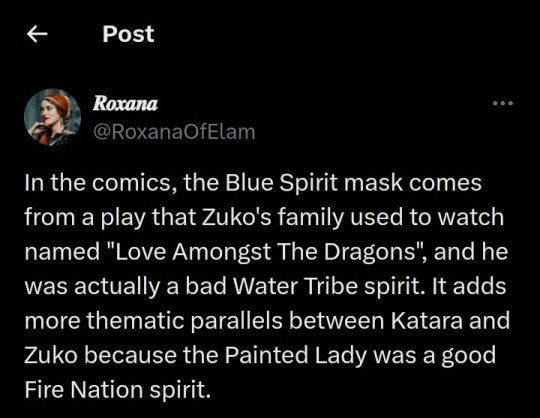
Zutara are parallels in every possible ways, yet they didn't end up together, and other shipper expect me to not upset about it?
2K notes
·
View notes
Text
the anti-Zutara criticism that “Zutara shippers are teenage girls who only like the ship because they self-insert as Katara” is actually so funny because how does that delegitimize the ship? So…girls who relate to Katara like Zuko, and they think Katara would like Zuko, and that’s bad because…girls are wrong? Girls are shallow? Girls don’t know what’s good for them?
Anyway if I were a grown ass man who created a fictional teenage girl that lots of real teenage girls relate to, and these girls believe she would like character B instead of character A, I hope I’d have the humility to say to myself “hmm I wonder why people who relate to this character’s feelings and motivations think she would react this way” instead of jumping straight to “these girls are doomed to like toxic relationships”
(And I know Zutara shippers like the ship for many different reasons, and self-insert is not the most popular by a long shot, I’m just saying that the criticism of self-insert stems from dismissal of what teenage girls like, and that feels kinda misogynistic to me)
#Zutara#pro Zutara#anti bryke#katara#Anti kataang#not really anti kataang but tagging it just in case#I should tag this “pro teenage girls”#My meta
976 notes
·
View notes
Text
When people try to justify Katara in TLOK by saying she's old I want to pull my hair out ! In this case, why is this not the case for other former members of the gaang who are active despite their old age ? Why does Katara have 0 statues in the town ? Why out of everything she could do, she's just kept as a great healer when that's not what she wanted in the original ? Why, if she is such a great healer, does she almost never manage to heal anyone ? Why does she never go anywhere unlike other gaang members who are so old ? Like the bloodbending trial ?! Since it was she who banned it (a very stupid thing, by the way). Like, his granddaughter's own ceremony ? Why isn't she there but Zuko is ?! How come Katara doesn't see her family often ?! She doesn't even try to see them ?! We're talking about Katara ! She would never do that ! Why do we learn more about Aang's role than Katara's about parent-child relationships ?! Stop trying to defend Katara's crappy writing from old age. Old age doesn't stop you from doing badass things in the Atla universe. Everyone forgot Bumi ?! I am so angry ! The simple truth is that Bryke, as in the comics, specifically erased Katara to reduce her to Aang's wife. That's all. Why am I making this rant ? Because I'm tired, once again, of seeing people defend Katara's writing in TLOK under the pretext that she's old, and especially seeing people say that the writing of strong women is even better in TLOK. Can we just talk about the horrible treatment of Korra herself in this ?! Not forgetting the worst thing I have ever seen ! To say that the treatment of Katara in TLOK is better than in the netlfix remake of Atla... How angry all this can make me !
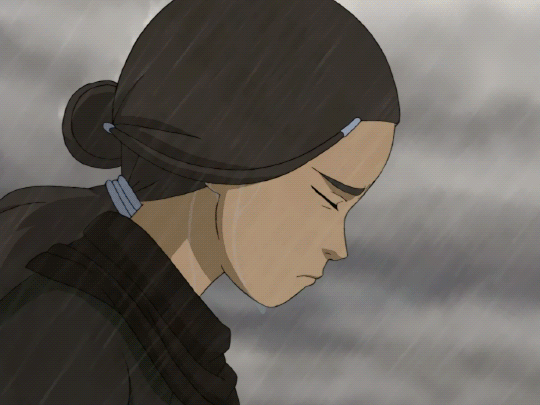
#zutara#pro zutara#katara#pro katara#katara atla#atla katara#zuko#pro zuko#prince zuko#pro prince zuko#fire lord zuko#pro fire lord zuko#zuko atla#atla zuko#anti tlok#anti the legend of korra#anti katara tlok#anti tlok katara#anti bryke#atla#avatar the last airbender#avatar : the last airbender#anti kataang
551 notes
·
View notes
Text
Katara's other canon love interests give her agency, and her pov.
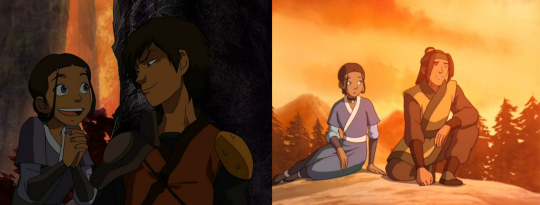
And gets a moment where the two connect over similar losses.

Except Aang.
Kataang is framed entirely from Aang's point of view.

Even when he violates her boundries.
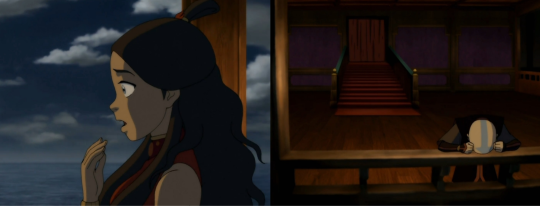
And is unable to handle Katara's grief.

But Zutara?
We get Katara's pov, and give her agency.

He saw her at her very worst, and wasn't at all hostile.

And Katara opened up to Zuko in the most significant way.
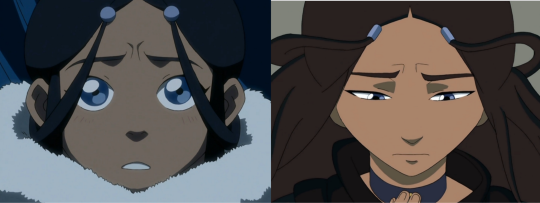
#How are they not canon#katara didn't even forgive Zuko while opening up to her#Aang had 3 books#and yet she opens up to Zuko#not her canonical love intetest#oh my god#zutara#zutara meta#anti kataang#aang critical#anti aang#anti anti zutara#kataang critical#the southern raiders#atla critical#anti bryke#bryke critical#avatar critical#pro zutara#pro zuko#zutara analysis#zutara was robbed#zutara forever#zutara evidence#katara of the southern water tribe#katara#zuko#zuko x katara#kataraxzuko#atla katara
2K notes
·
View notes
Text
You know as much as I don't care about Legend of Korra and hate what it did to the worldbuilding and rules set in ATLA, it's still boggles me till this day that Mike and Bryan had Korra paraphrase Ozai of all people. Their writing is dogshit and aspects of it stink with sexism but this is just vile.
11 notes
·
View notes
Text
I just realized another reason why “The Search” (and the comics more broadly, of course) is awful: why doesn’t Iroh, who was crown prince, Azulon’s favored son, the Fire Nation’s darling, doubtlessly someone who has many connections in court, and someone who canonically knew that Roku was Zuko’s grandfather, know most of the basics of Ursa’s story and marriage, even if he doesn’t know what happened to her? Why wouldn’t have Azulon told him basically everything anyways? And if Iroh knows, why hasn’t he told Zuko anything? Why doesn’t Zuko think to ask him?
#Zuko#Iroh#Ursa#the search#anti-the search#anti-comics#anti Yang#anti-Bryke#anti Bryke#anti-yang#Seriously this makes no sense#Iroh should be able to tell Zuko a lot about his mother#honestly I struggle to think of any good reason why he wouldn't know where Ursa is from
153 notes
·
View notes
Text
It’s really funny how much people misremember certain aspects of ATLA and then proclaim to the internet stuff that either never happened or is extremely distorted with absolute certainty. For example, today I saw a person claiming that whole point of Katara’s character arc was unlearning the parentified behaviours she developed in wake of her mother’s death. That a huge part of Katara’s arc was a confrontation of how that trauma fundamentally shaped her maternal tendencies.
The thing is though…WE the audience, can recognize that the parentification Katara experienced was something that was really straining for her, but the TEXT doesn’t. The audience (or at least certain parts of the audience) can identify that her maternal tendencies were indicative of a responsibility that she took on far too young and subjected her to unnecessary pressure and stress. There are flashes of recognition maybe, but for the most part, the show doesn’t actually confront the negative impact that Katara’s maternal role had on her.
Katara never truly unlearns the maternal behaviours that put so much pressure on her because the text doesn’t see it as a bad thing. Arguably, the text doesn’t see much of a problem with the emotional labour Katara takes on and how that labour goes unreciprocated for the most part (particularly from her canon love interest). We see some reflections, but it’s not enough to support a reading of the text where that element is actually extremely obvious and a prominent point in her character arc.
We’re not the ones “watching the show with our eyes closed”, I think you’re just misremembering the canon progression of Katara’s arc to avoid confronting a real issue in the text.
#Katara#pro katara#avatar the last airbender#atla fandom critical#atla discourse#the gaang#character analysis#atla fandom discourse#zutara#atla critical#anti bryke
419 notes
·
View notes